- Nearly 150,000km² of seafloor surveyed across the Mozambique Channel, Madagascar Ridge, Agulhas Plateau, and Cabo Verde
- 69 scientists from 31 countries and 29 institutions successfully conducted deep-sea dives, geological and biodiversity sampling, and oceanographic research in seven key regions around the African coastline
- 306 students, educators, and early-career professionals from across Africa and the world engaged through training, outreach, and capacity sharing initiatives on the OceanXplorer research vessel
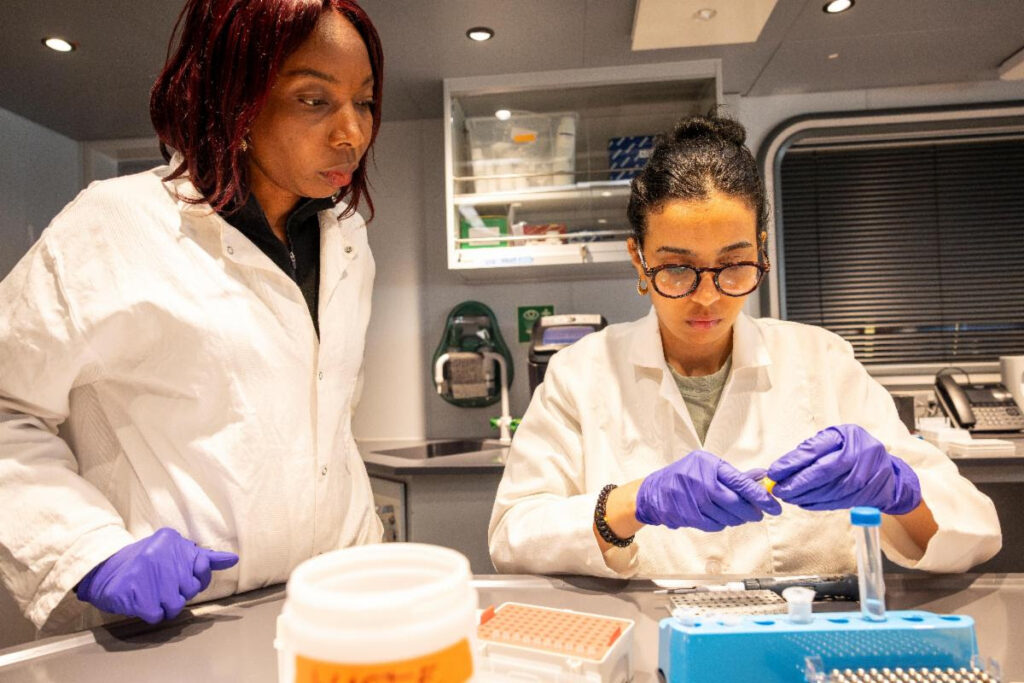
JOHANNESBURG, South Africa, 9th May 2025 -/African Media Agency(AMA)/ – A transformational joint exploration led by OceanX and OceanQuest has officially concluded the ‘Around Africa Expedition’, a major ocean research and capacity-sharing mission advancing deep-sea research, oceanographic mapping, and scientific collaboration across Africa’s coastal waters.
The expedition navigated critical marine regions, starting from Moroni (Comoros Archipelago) and navigating through the Mozambique Channel, the southern Madagascar Ridge (Walters Shoal), Agulhas Plateau (Africana Seamount), Cape Town (South Africa), the Benguela Current System in the southeastern Atlantic, Walvis Bay (Namibia), Mindelo and the Nola Seamounts in Cabo Verde, and ending in Las Palmas de Gran Canaria in the Canary Islands (Spain).
Conducted between January and April, the expedition delivered significant insights and new valuable data about Africa’s marine ecosystems, surveyed vast areas of previously unexplored seafloor, and strengthened Africa’s leadership in ocean science through international collaboration and capacity sharing.
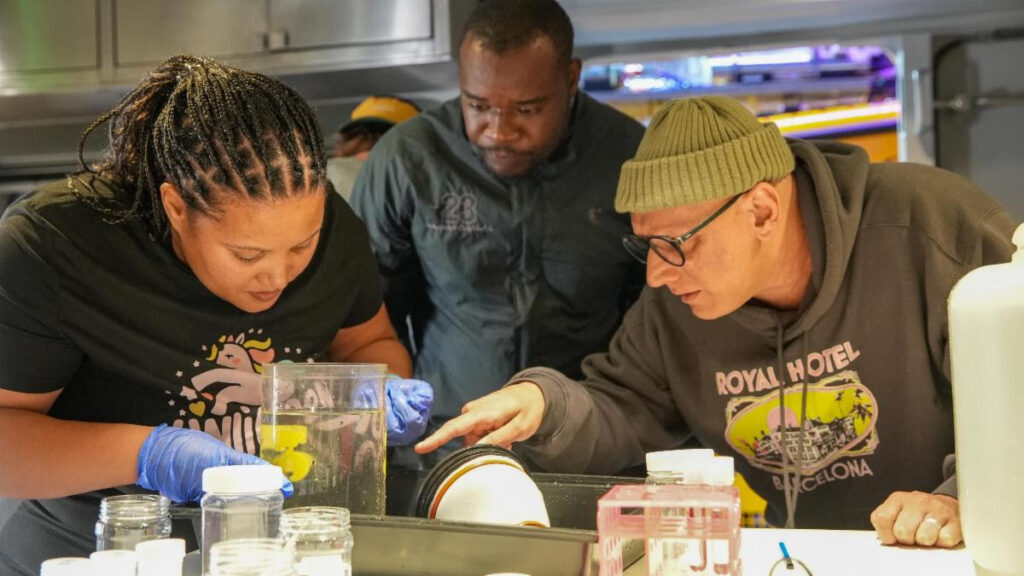
Expedition Scope and Key Achievements
Researchers conducted extensive fieldwork including remotely operated vehicle (ROV) dives, oceanographic sampling, biodiversity surveys, and high-resolution seafloor mapping, unlocking new insights into Africa’s marine ecosystems.
OceanXplorer, the expedition’s advanced research vessel, completed eight ROV dives, totalling 21 hours underwater, including the first-ever visual surveys of the deep flanks of Walters Shoal and a newly mapped seamount at the southern Madagascar Ridge, as well as the Nola seamounts off Cabo Verde. Submersibles Neptune and Nadir executed nine dives, collecting 41 biological and geological samples across 32 hours of deep-sea exploration.
In total, nearly 150,000km² of seafloor was mapped across regions including the Madagascar Ridge, Agulhas Plateau, and Cabo Verde’s Nola Seamounts, providing vital data for deep ocean science and discovery, marine spatial planning, and conservation opportunities. “This is not just a scientific achievement, but a continental one,” says Vincent Pieribone, co-CEO and Chief Science Officer for OceanX. “The knowledge gained here belongs to Africa and will benefit research and scientific communities for generations to come.”
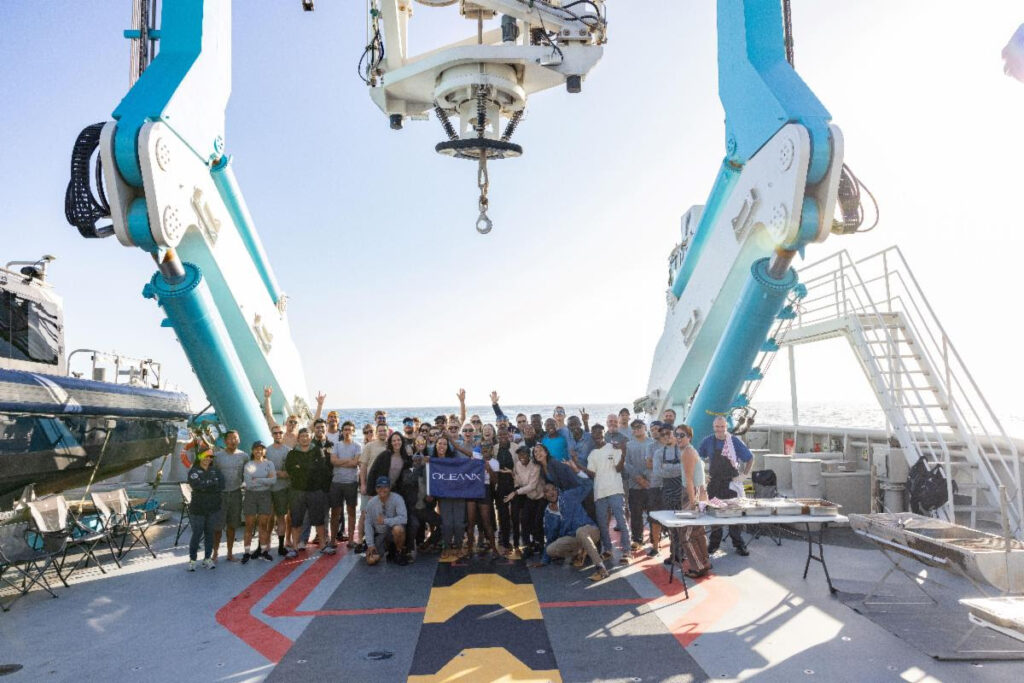
Key Findings During the ‘Around Africa Expedition’
Two segments of the expedition were dedicated to deep-sea missions, designed to advance the understanding of the biological, geological, and oceanographic processes shaping the seafloor and ecosystems of the Southwest Indian Ocean and the eastern Atlantic. By investigating remote seamounts, surveying deep habitats, and analysing ocean dynamics, the teams generated critical baseline data to support marine conservation, sustainable resource management, and adaptation to climate change impacts.
As African nations increasingly recognise the critical importance of healthy ocean ecosystems for economic development, environmental security, this research provides essential knowledge and tools to inform more sustainable marine governance across the continent.
Key outcomes included:
- The high-resolution mapping of seamounts and the surrounding seafloor, vital for fisheries, biodiversity, and habitat protection
- Detailed analysis of ocean currents to better understand regional climate patterns
- Analysis of marine microbes and aerosols, which play key roles in ocean food chains, carbon storage, and climate regulation, contributing critical data to global ocean health research
“The opportunity to conduct deep-sea research alongside an international team, with African scientists leading key legs, was a turning point,” said Dr. Lara Atkinson, Marine Offshore Scientist at NRF-SAEON. “For many of us, it was the first time we had access to this level of deep-sea technology and interdisciplinary collaboration among so many nations.”
“Being part of this expedition felt like reclaiming our own narrative in ocean science,” said Dr. Yara Rodrigues, Executive Vogal at Instituto do Mar. “We weren’t just collecting data, we were shaping the future of marine knowledge in Africa, based on our needs, in our waters.”
Their involvement was part of a broader collaboration between OceanX, OceanQuest, and leading African institutions. These included the National Research Foundation – South African Environmental Observation Network (NRF-SAEON), the University of Cape Town (UCT), the South African National Biodiversity Institute (SANBI), the Instituto do Mar (IMar) in Cabo Verde, the Ocean Science Center Mindelo (OSCM), and the Universidade Técnica do Atlántico (UTA). This strengthened scientific partnerships and promoted data sharing across the continent.
“These collaborations are the future of ocean science in Africa,” said Pieribone. “We’ve seen what’s possible when scientists, governments, and regional institutions align behind a common purpose-advancing knowledge, access, and opportunity.”
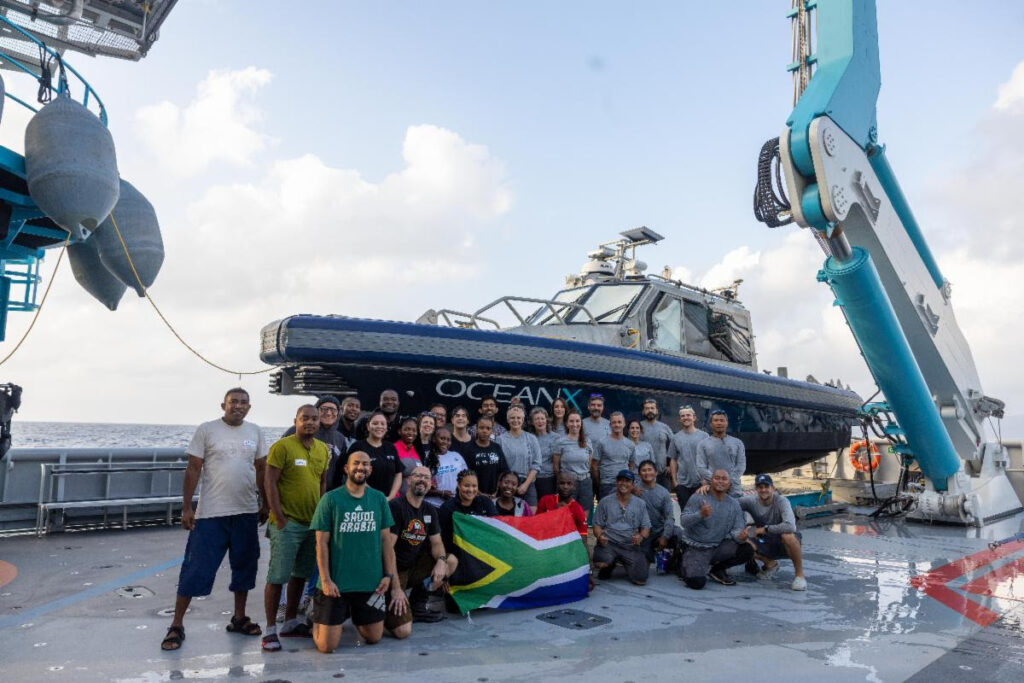
Science Diplomacy and Regional Leadership
The expedition also marked a series of significant diplomatic milestones, with visits from South Africa’s Minister of Environment, Forestry and Fisheries Dion George and Minister of Tourism Patricia De Lille, Cabo Verde’s Minister of the Sea Jorge Santos and the President of the Republic of Cabo Verde, José Maria Neves. As Patron of the United Nations Decade of Ocean Science for Sustainable Development, President Neves reaffirmed Cabo Verde’s strong commitment and leadership in advancing ocean knowledge, marine conservation, and sustainable blue development.
‘These high-level engagements’, says Martin Visbeck, Chief Executive Officer of OceanQuest, ‘underscored regional commitment to ocean science and sustainability, enhanced cooperation across the continent, and demonstrated both Africa and Cabo Verde’s growing leadership in addressing the most pressing challenges facing our oceans.’
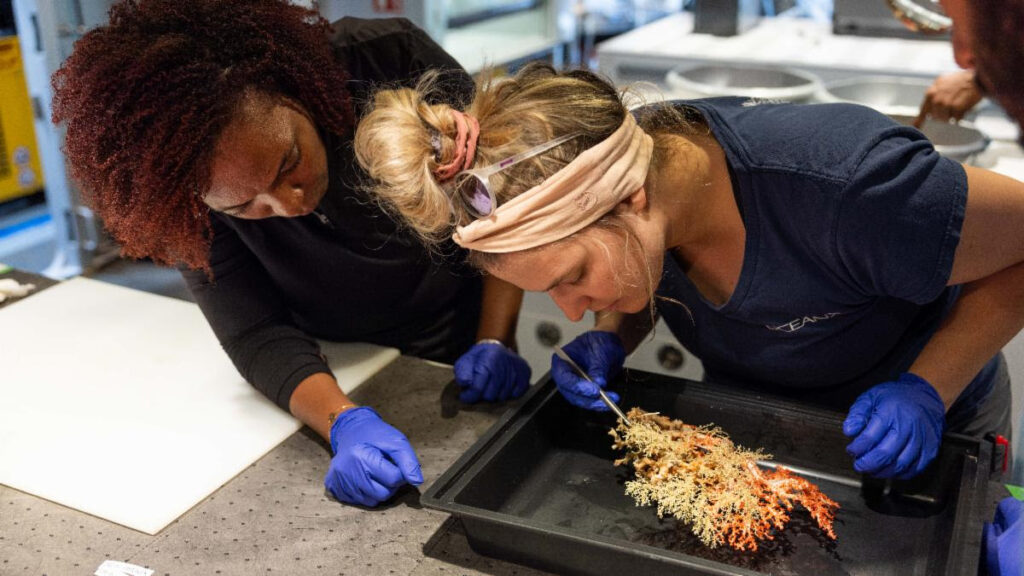
Capacity Sharing and Education
A major pillar of the expedition, focused on strengthening African scientific and technical capacity through targeted education and professional development programmes. Led by OceanX education, the expedition was structured around three core components. These included two deep-sea science legs focused on seamount research, two youth-led investigator legs, and two ECOP training legs.
The mission featured outreach programmes at port stops to engage local communities:
- Early Career Explorers (ECEs) Programme: 27 Early Career Ocean Professionals (ECOPs) from across Africa, including Ghana, Kenya, Namibia, Nigeria, South Africa, Mozambique, Angola, Cabo Verde, Tunisia, Morocco, and Tanzania, took part in multi-day, on-ship education programmes between Walvis Bay, Mindelo, and Las Palmas, gaining hands-on experience in oceanography, bathymetry, and environmental DNA (eDNA) analysis. Participants were selected by the Partnership for the Observation of the Global Ocean (POGO) through a programme jointly run by OceanX, OceanQuest, and POGO.
- Young Explorers: 29 university students who are interested in future ocean-related careers joined the multi-day, on-ship education programs from Maldives to Comoros and from Cape Town to Walvis Bay, learning about the multi-disciplinary career paths that can support ocean health and sustainability.
- Science-Leg ECOP Participation: Four African ECOPs were embedded within research science legs, contributing directly to fieldwork in South African and Cabo Verdean waters.
- Portside Ship Tours: 246 students and educators participated in shipboard tours and outreach events across Cape Town, Mindelo, and Las Palmas, introducing new generations to marine science careers and ocean stewardship.
- Total engagement: 306 students, educators, and early-career professionals were reached through the expedition’s training and outreach programs.
“This wasn’t just about what we discovered in the ocean. It was also about who we empowered on the ground,” adds Martin Visbeck, CEO of OceanQuest. “By working together across borders, we have made this kind of world-class science possible right here in African waters and led by African scientists.”
The OceanX and OceanQuest Around Africa Expedition is officially endorsed by the United Nations Decade of Ocean Science for Sustainable Development for its contributions to capacity sharing and scientific understanding of the ocean, providing valuable data for science and science-based ocean governance.
Next Steps
Although the expedition at sea has concluded, analysis of the collected data has only just begun. Scientists across Africa and globally will use the expedition’s findings to:
- Inform environmental and ocean management policy
- Support fisheries regulation and marine conservation, and
- Strengthen Africa’s leadership in ocean science and sustainable development
“This is just the start,” said Pieribone. “We’ve built the foundation for a new age of African-led research, and now the real impact begins. Our goal is that the discoveries made, and the partnerships formed during this expedition will continue to shape policy, support conservation efforts, and inspire the next generation of ocean explorers.”
Distributed by African Media Agency (AMA) on behalf of OceanX and OceanQuest.
A full list of NGO, education, and government partners across the region and mission leg follows below:
Mindelo, Cabo Verde
Instituto do Mar (IMar), the Ocean Science Center Mindelo (OSCM),Instituto de Engenharias e Ciências do Mar (ISECMAR) – Universidade Técnica do Atlântico, Centro Universitário Cidade Verde (UniCV), Universidade do Mindelo, Escola Salesiana de Artes e Ofícios (Ilha de São Vicente), Escola Secundária Januário Leite (Ilha de Santo Antão), Escola Técnica João Varela (Ilha de Santo Antão).
Cape Town, South Africa
SANBI, National Research Foundation, Department of Forestry, Fisheries and Environment, South African Environmental Observation Network (SAEON) – Science for Kids and Global Blue Schools Network, University of Cape Town, University of Western Cape, Stellenbosch University, Cape Peninsula University of Technology
Las Palmas, Canary Islands, Spain
Oceanic Platform of the Canary Islands (PLOCAN), Consejeria de Educacion (Canary Islands Regional Government), IES Profesor Antonio Cabrera Pérez, ITS Jozef Stefan.
Global
UN Ocean Decade – Endorsed Decade Actions, Partnership for Observation of the Global Ocean (POGO), Ocean Biomolecular Observing Network (OBON), Challenger 150, Deep-Ocean Stewardship Initiative (DOSI)
Regional
Partnership for Atlantic Cooperation, African Network of Deep-water Researchers, Challenger 150
United States
City College of New York (CCNY), Columbia University Climate School – Lamont-Doherty Earth Observatory (LDEO), US National Oceanic and Atmospheric Administration (NOAA), US National Aeronautics and Space Administration (NASA), US State Department, US Office of Naval Research (ONR), Woods Hole Oceanographic Institution (WHOI)
Route-Specific Partnerships by Country/Transit locations:
Comoros to Cape Town, South Africa
National Research Foundation – South African Environmental Observation Network (NRF-SAEON), South African National Biodiversity Insitute (SANBI), South African National Space Agency (SANSA), National Research Foundation – South African Institute for Aquatic Biodiversity (NRF-SAIAB), University of Cape Town (UCT), University of KwaZulu-Natal, Université de Toliara – Institut D’Enseignement Supérieur D’Anosy (IES-Anosy) – Madagascar, Université de Toliara – Institut Halieutique et des Sciences Marines (IHSM) – Madagascar, Ministry of Foreign Affairs, Republic of Madagascar, Universidade Lúrio – Mozambique, Wildlife Conservation Society (WCS) – Mozambique, Universidade Federal do Espírito Santo (UFES) – Brazil, Kenya Marine and Fisheries Research Institute (KMFRI) – Kenya, Universidade de Aveiro – Portugal, King Abdullah University of Science and Technology (KAUST) – Kingdom of Saudi Arabia, Columbia University – Lamont-Doherty Earth Observatory (LDEO) – USA, Challenger 150
Namibia – Cabo Verde; Cabo Verde Science
Instituto Do Mar (IMar), Campus do Mar, Universidade Técnica do Atlântico (UTA), Campus do Mar, Ocean Science Center Mindelo (OSCM), GEOMAR Helmholtz Centre for Ocean Research – Germany, King Abdullah University of Science and Technology (KAUST) – Kingdom of Saudi Arabia, South African National Biodiversity Insitute (SANBI) – South Africa, Universidade do Vale do Itajaí (UNIVALI) – Brazil, US National Aeronautics and Space Administration (NASA), Partnership for Observation of the Global Ocean (POGO)
Cabo Verde – Las Palmas de Gran Canaria
Plataforma Oceánica de Canarias (PLOCAN), Universidad de Las Palmas de Gran Canaria (ULPGC), GEOMAR Helmholtz Centre for Ocean Research – Germany, Columbia University Climate School – Lamont-Doherty Earth Observatory, US National Aeronautics and Space Administration (NASA), Partnership for Observation of the Global Ocean (POGO)
About OceanX
OceanX is on a mission to support scientists to explore the ocean and to bring it back to the world through captivating media. Uniting leading media, science, and philanthropy partners, OceanX utilizes next-gen technology, fearless science, compelling storytelling, and immersive experiences to educate, inspire, and connect the world with the ocean and build a global community deeply engaged with understanding, enjoying, and protecting our oceans. OceanX is an operating program of Dalio Philanthropies, which furthers the diverse philanthropic interests of Dalio family members. For more information, visit www.oceanx.org and follow OceanX on YouTube, Facebook, Instagram, TikTok, X, and LinkedIn.
About OceanQuest
OceanQuest is a Saudi Arabian not-for-profit foundation, committed to unveiling the wonders of the ocean and exploring its secrets for the benefit of humanity. Its mission is to accelerate ocean discovery, drive innovation in the field, support global cooperation, and excite the public. OceanQuest and its global partners will launch a new era of deep ocean exploration and knowledge sharing. OceanQuest is based in the King Abdullah University of Science and Technology (KAUST) campus in Thuwal, Kingdom of Saudi Arabia. To learn more visit www.OQFoundation.org.
For Media Inquiries Contact
Amy Minnie
Account Manager
African Media Agency (AMA)

